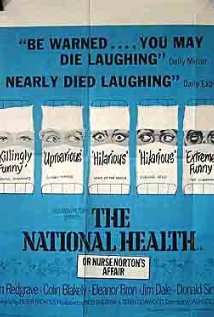The National Health (film)
The National Health is a British comedy film directed by Jack Gold and released in 1973. It is based on the play of the same name by Peter Nichols, which satirizes the National Health Service (NHS), depicting both the operations of the hospital system and the lives of its staff. The film blends elements of dark humor and social commentary, reflecting on the state of the British healthcare system during the early 1970s.
Plot[edit | edit source]
The narrative of The National Health is split between the grim reality of a dilapidated NHS hospital and a parallel soap opera fantasy, which features idealized versions of the hospital staff. In the real world, the hospital is understaffed, the buildings are falling apart, and the patients suffer from neglect. In contrast, the soap opera segments feature attractive, efficient doctors and nurses working in a pristine hospital environment. This juxtaposition serves to highlight the deficiencies and challenges faced by the actual NHS, as well as the public's escapist fantasies about healthcare.
Cast[edit | edit source]
The film features an ensemble cast, including notable actors such as Eleanor Bron, Donald Sinden, Jim Dale, and Bob Hoskins in one of his early film roles. Each actor plays dual roles, appearing as both a character in the grim reality of the NHS and as their soap opera counterpart.
Production[edit | edit source]
The National Health was adapted from Peter Nichols' play, which had been successfully staged in London. The transition from stage to screen allowed for a broader exploration of the themes and a more vivid depiction of the contrasting environments. Director Jack Gold, known for his work in British television and film, utilized a mix of satire and drama to engage with the subject matter critically.
Reception[edit | edit source]
Upon its release, The National Health received mixed reviews. Critics praised its bold commentary on the NHS and the performances of the cast but noted that the film's bleak outlook and dark humor might not appeal to all audiences. Over the years, it has gained recognition for its unflinching portrayal of the healthcare system and its innovative narrative structure.
Legacy[edit | edit source]
The film remains a significant cultural artifact, reflecting the concerns and debates surrounding the NHS in the 1970s. It is studied for its unique approach to social satire, its commentary on public health, and its contribution to the genre of British comedy films. The National Health continues to be relevant, as discussions about healthcare systems and their efficacy remain central to public discourse.
Search WikiMD
Ad.Tired of being Overweight? Try W8MD's physician weight loss program.
Semaglutide (Ozempic / Wegovy and Tirzepatide (Mounjaro / Zepbound) available.
Advertise on WikiMD
|
WikiMD's Wellness Encyclopedia |
| Let Food Be Thy Medicine Medicine Thy Food - Hippocrates |
Translate this page: - East Asian
中文,
日本,
한국어,
South Asian
हिन्दी,
தமிழ்,
తెలుగు,
Urdu,
ಕನ್ನಡ,
Southeast Asian
Indonesian,
Vietnamese,
Thai,
မြန်မာဘာသာ,
বাংলা
European
español,
Deutsch,
français,
Greek,
português do Brasil,
polski,
română,
русский,
Nederlands,
norsk,
svenska,
suomi,
Italian
Middle Eastern & African
عربى,
Turkish,
Persian,
Hebrew,
Afrikaans,
isiZulu,
Kiswahili,
Other
Bulgarian,
Hungarian,
Czech,
Swedish,
മലയാളം,
मराठी,
ਪੰਜਾਬੀ,
ગુજરાતી,
Portuguese,
Ukrainian
Medical Disclaimer: WikiMD is not a substitute for professional medical advice. The information on WikiMD is provided as an information resource only, may be incorrect, outdated or misleading, and is not to be used or relied on for any diagnostic or treatment purposes. Please consult your health care provider before making any healthcare decisions or for guidance about a specific medical condition. WikiMD expressly disclaims responsibility, and shall have no liability, for any damages, loss, injury, or liability whatsoever suffered as a result of your reliance on the information contained in this site. By visiting this site you agree to the foregoing terms and conditions, which may from time to time be changed or supplemented by WikiMD. If you do not agree to the foregoing terms and conditions, you should not enter or use this site. See full disclaimer.
Credits:Most images are courtesy of Wikimedia commons, and templates Wikipedia, licensed under CC BY SA or similar.
Contributors: Prab R. Tumpati, MD

